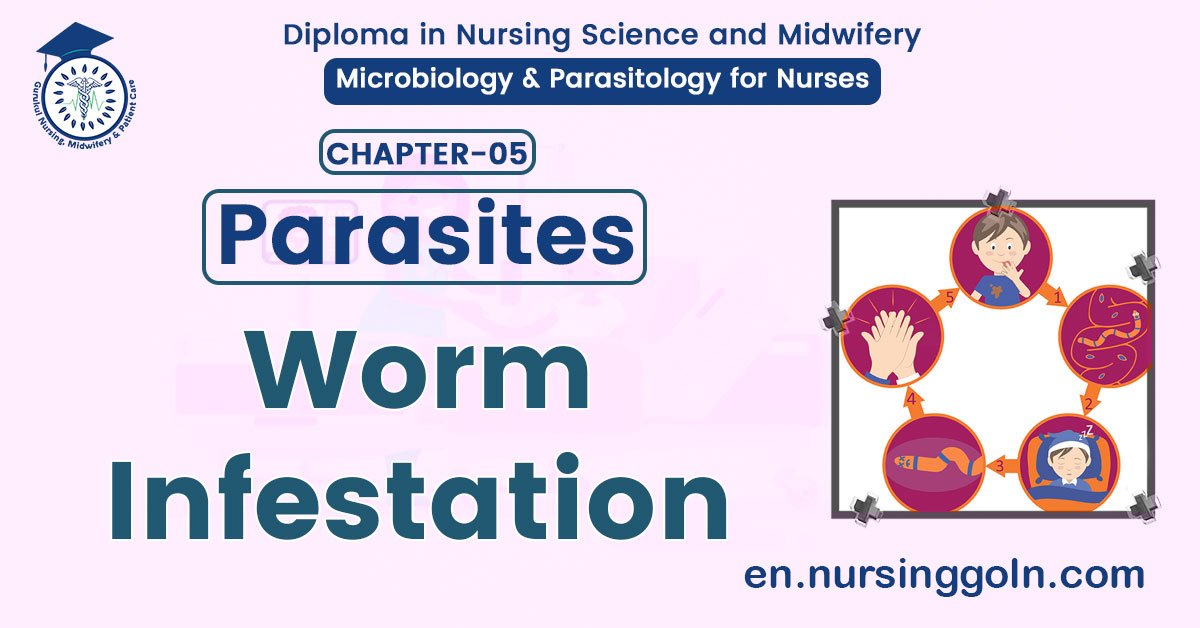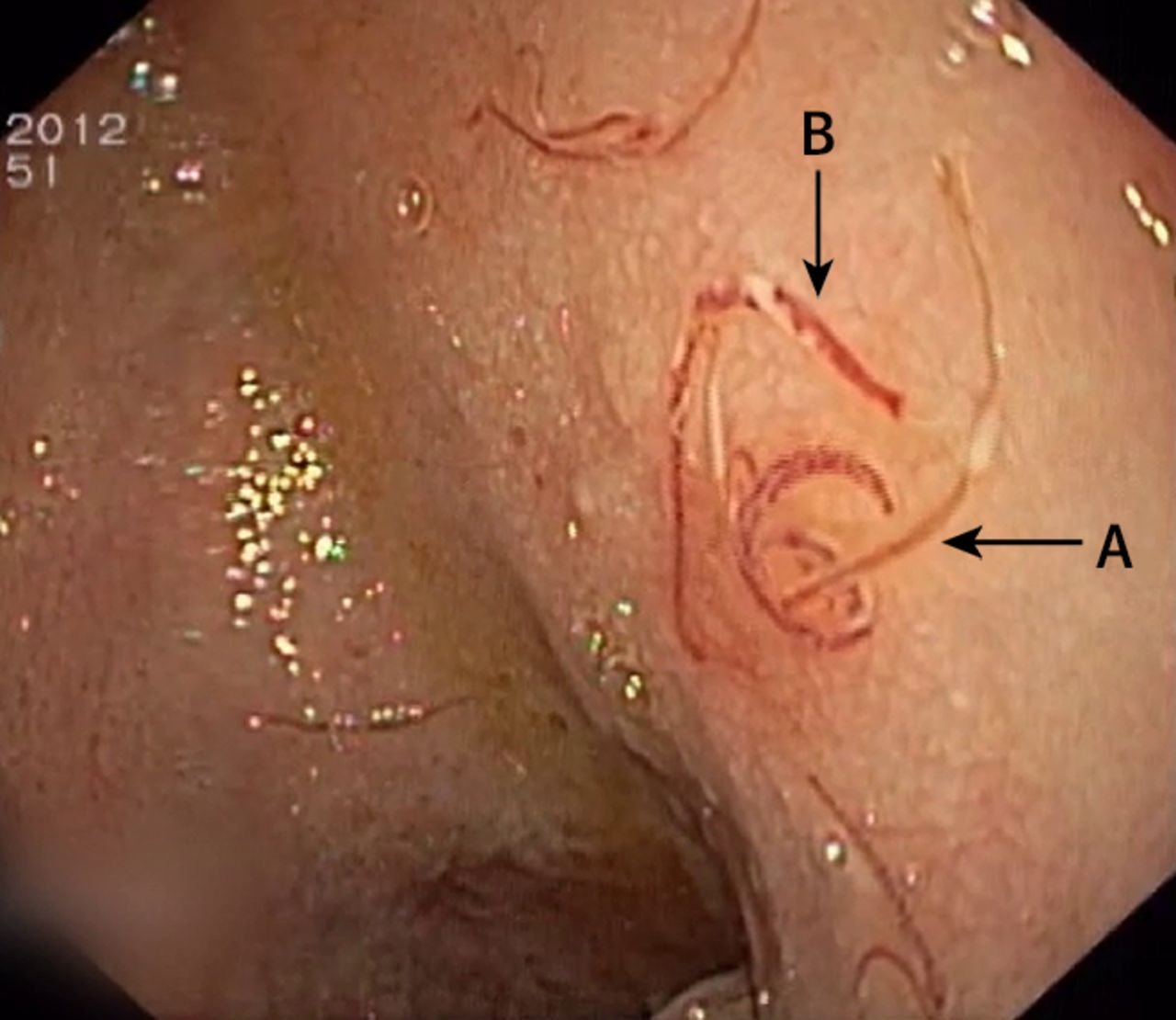Concept about Worm Infestation – Basic microbiology, parasitology, and immunology; nature, reproduction, growth, and transmission of common microorganisms and parasites in Bangladesh; prevention including universal precaution and immunization, control, sterilization, and disinfection; and specimen collections and examination. Students will have an understanding of common organisms and parasites caused human diseases and acquire knowledge about the prevention and control of those organisms.
Concept about Worm Infestation
Worm infestation occurs when worms live as parasitic adults in the human gastrointestinal tract. Worms that infect humans can be divided into three groups:
1. Roundworms, whipworms, hookworms
2. Tapeworms
3. Flukes
A patient with a mild infection may not show any symptom. However, some may experience itching around the anal area especially at night when the female worm deposits eggs in the perianal region. Other symptoms include poor appetite which leads to weight loss, stomach discomfort, restless sleep and inability to concentrate. A worm passed with a stool may also be discovered by the patient.
The most common route of transmission for worm infestation is the anus-to-mouth route. This is because eggs are often found under the fingernails of the infected person who has scratched the anal area. When the infected person uses the contaminated fingers to handle and ingest food, the eggs are transferred directly from the anus to the mouth.
Eggs dislodged from the perianal area into the environment can also be inhaled. Eggs may also be spread by house dust, from pets or through contact with contaminated objects such as bedding, cups, utensils and doorknobs.
Definition of Worm Infestation
Worm infestation occurs when worms live as parasitic adults in the human gastrointestinal tract.
Worms that infect humans can be divided into three groups:
1. Roundworms, whipworms, hookworms
2. Tapeworms
3. Flukes
Types of Worm Infection
There are countless number of species in this world. These parasites, which harbor in your child’s intestine also come in various forms, shapes and sizes. Below are most common types of worm infections that trouble children:
1. Tapeworms: These are flat, ribbon-like worms that can grow up to 15-30 ft and thrive in the intestine
2. Roundworms: They resemble earthworms and can grow up to the size of 30-35 cm
3. Pinworms or thread-worms: As the name suggests, thread-worms appear to be fine white cottony threads and live in intestine and around anus of the individual
4. Hookworms: These are commonly contracted through coming in touch with the 4 contaminated soil and later enter intestine
Symptoms of Worm Infections in Children
Apart from a stomach ache, irritability and some weight loss, worm infection can be denoted by following signs:
Tapeworm Infection
1. Nausea and vomiting
2. Loss of appetite, sometimes eating too frequently and weight loss: These usually
appear in case of infection by tapeworms. Malnutrition may also be seen
3. jaundice: this is more common in tapeworm infections
Thread-worm Infection
1. Itching around anus is a common complaint in children who have thread-worm infection. Thread-worms creep out during night and lay eggs near anus which can trigger itching
2. Trouble sleeping (due to itching)
3. Painful urination: this is typical in thread-worm infestation
Roundworm Infection
1. Diarrhea, passing worms with stools: If roundworm infection persists, then mature worms may be passed out from stools
2. Fever and dry cough: These are spotted within 4-16 days after coming in contact with the roundworm eggs
Hookworm Infection
1. Coughing, wheezing: Such respiratory troubles may crop up when the hookworm larvae attack lungs
2. Anemia, fatigue: These symptoms can be seen in case of severe hookworm infection
Causes of Worm Infestation
A few common causes of worm infection include
1. Coming in contact with infected surface: The worms and their eggs are capable of surviving up to two weeks without feeding. Some of the most common places where your kid may contract worm infestation are:
- soil containing worms or eggs – in playground or outdoor play
- touching pets or their excrement infected with worms
2. Inadequate hand washing: It’s difficult to keep young kids from putting things in their mouth. If your kid is suffering from worms, there will be itching around anus, particularly in case of pin worms. During scratching, the eggs of the worms come in contact with the skin on hand, which wherever touched tends to spread. The worse scenario is when kids put that hand back in the mouth, such as for thumb sucking or pleasure. Read more about children and
3. Improper hygiene: Unwashed bedding, undergarments, filth in the room all present breeding room for worms and their eggs. Someone who has not washed hands properly can also pose a risk for others as worm eggs can stay on fingernails which can be passed to you child through touching
4. Consuming infected food or water: It is very important to wash vegetables and fruits before consumption as worm eggs can be on them. Raw or under-cooked food also carries a risk of worm infestation. Contaminated water is again a very common source of worm infestation.
Preventive Measure of Worm Infestation
1. Primary prevention
- Sanitary disposal of faeces
- Provision of safe drinking water
- Food hygiene habits
- Health education of community regarding: Use of sanitary latrines, personal hygiene, and changing behavioural patterns.
2. Secondary prevention:
- Albendazole: 400mg all ages above 2 years, Single dose
- Mebendazole: 500 mg single dose or 100 mg twice daily for 3 days.
3. Other Measure for Children:
- Inculcate the habit of frequently and thoroughly washing the hands with a good antibacterial soap
- Teach your kid to drink clean, filtered or boiled water. Practice the same at home
- Make sure your kids change their undergarments daily
- Wash their bedding, pillow covers, blanket etc. regularly
- Sterilize your toddler’s toys
- Encourage your kid to play in dry areas and not splash in muddy puddles as these horde millions of germs
- Make sure that your veggies and meat are thoroughly cooked before you serve them
to your kid - Keep your kid’s nails well-trimmed. Show them how dirt collects under long.fingernails and must be kept clean
- Washing hands thoroughly before eating anything should be the rule!
- Teach potty hygiene
- Do not share towels and undergarments
- Teach your kid to shower regularly. Practice thorough cleaning of private parts
- Clean your house thoroughly and with proper disinfectants
- Allow plenty of sunshine in your kid’s room. Some worms are sensitive to light and nothing better than letting the sun do this job



